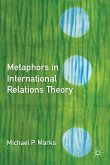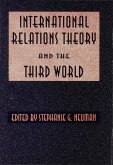Metaphors constitute a fundamental way in which humans understand the world around them. This book offers a comprehensive analysis of metaphors in theories of international relations. Until recently, conscious attention to metaphors in theories of international relations has been haphazard and sporadic. This book examines the metaphors that inform the major paradigms in international relations theory. Readers will discover that the vast majority of the terminology cataloguing, defining, and naming theories, concepts, and analytical tools pertaining to the study of international relations are metaphorical in nature. The book concludes that metaphors are an essential element in all aspects of international relations theory.
"This book is a comprehensive analysis of metaphors used across International Relations' schools of thought or paradigms. It is clearly written and very accessible with impressive coverage and an important argument. It will be accessible even to upper-level undergraduate audiences and may be most useful for undergraduates who are not yet in the clutches of the disciplinary imperative to ignore the centrality of metaphor to our scholarly practice."
- David L. Blaney, Political Science, Macalester College
- David L. Blaney, Political Science, Macalester College









